Overview
This article highlights vital resources for effective advocacy in adult autism, underlining the necessity for comprehensive support across various areas such as:
- healthcare
- employment
- housing
- communication
- self-identity
Understanding the unique challenges faced by autistic individuals is crucial, and this piece provides valuable strategies and resources aimed at empowering advocates. By fostering a more inclusive environment that addresses these specific needs, we can make a meaningful impact in the lives of those affected. Together, we can advocate for change and support one another in this important journey.
Introduction
Understanding the landscape of autism advocacy is essential. It empowers individuals and families as they navigate the complexities of autism spectrum disorder (ASD). With a wealth of resources available, advocates can truly enhance their ability to support autistic adults and promote inclusive practices across various sectors. Yet, the challenge remains: how do we identify which resources are genuinely effective and leverage them for maximum impact? This article explores ten essential resources that can transform advocacy efforts, ensuring that autistic individuals receive the respect, understanding, and opportunities they deserve.
About ASD Media: Comprehensive Resources for Autism Advocacy
At ASD Media, we are deeply committed to enhancing the application of ABA therapy, providing a wealth of tools and insights tailored for both parents and professionals. Our mission is to cultivate a nurturing community where individuals can share their experiences and learn from one another. By subscribing to our newsletter, you will gain access to the latest news and invaluable adult autism resources that are designed to empower you in navigating the complexities of autism advocacy with confidence and clarity. Join us in this journey of support and growth, and let’s make a difference together.
Respect in Health Care for Autistic Adults: Key Insights from Harvard Health
Harvard Health highlights the vital importance of respectful healthcare interactions for individuals on the autism spectrum, who frequently encounter significant challenges in accessing quality care. These challenges often stem from a lack of understanding among healthcare providers regarding the specific needs of autistic individuals. Many autistic adults share their struggles with communication, feelings of anxiety during medical appointments, and hesitance to disclose their diagnosis, which can impede their ability to receive the care they require.
Statistics reveal that individuals with autism are 2.6 times more likely to experience physical health issues compared to their non-autistic peers, underscoring the urgent need to address these barriers to healthcare access. Advocacy efforts play a critical role in overcoming these obstacles, ensuring that individuals on the spectrum are treated with the respect and understanding they rightfully deserve during medical encounters.
Initiatives such as the six recommendations aimed at improving healthcare access for individuals with ASD can empower advocates to raise awareness and promote tailored strategies within healthcare settings. By fostering connections between those with autism and healthcare providers, advocates can ultimately enhance health outcomes and improve access to essential services. Together, we can work towards a more inclusive healthcare environment that meets the unique needs of every individual.
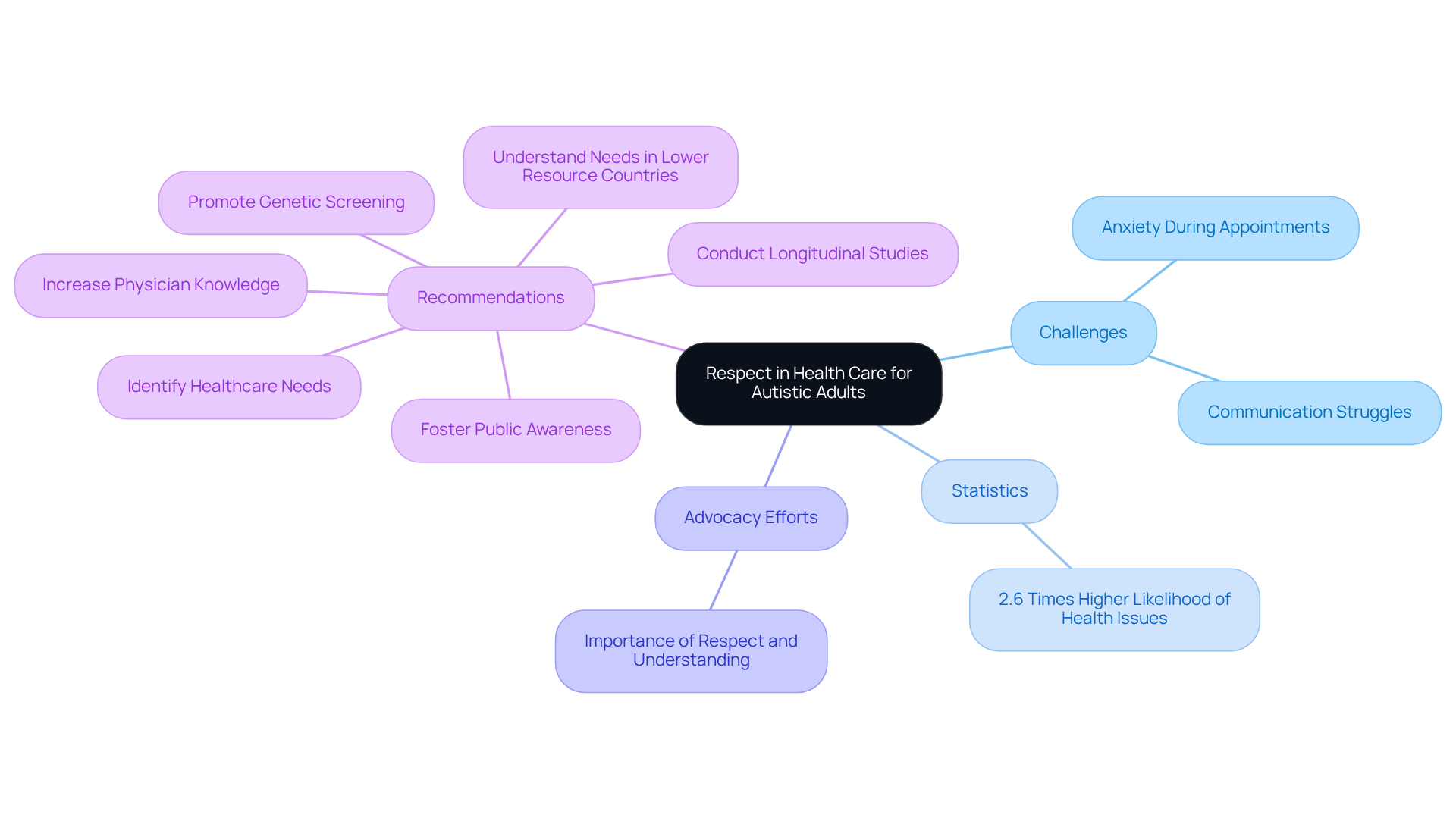
Autism and Co-Occurring Conditions: Insights from Autism BC
Insights from Autism BC highlight a significant reality: many individuals on the spectrum face co-occurring conditions like anxiety, ADHD, and depression. Consider this: nearly 39.5% of children with developmental disorders experience anxiety, while 15.7% struggle with depression. Furthermore, 30% of the ASD population suffers from anxiety—substantially higher than the 10% seen in the general population. Similarly, 26% of those with ASD experience depression, compared to just 10% in the general population.
Acknowledging these mental health challenges is crucial for effective advocacy; it allows advocates to adopt a more holistic approach to support. By understanding these co-occurring conditions, advocates can better assist autistic individuals and their families in navigating the complexities of mental health care and accessing adult autism resources.
Notably, a staggering 91% of children and adolescents with ASD were diagnosed with one or more co-occurring diagnoses using the MINI, underscoring the high prevalence of these conditions. This awareness fosters a supportive atmosphere that addresses not only the primary symptoms of autism but also the related mental health challenges that can significantly impact overall well-being.
As Connor M. Kerns insightfully notes, "There’s something particular regarding the condition that is heightening this mental health burden," which emphasizes the need for focused advocacy efforts. Additionally, it's important to recognize that nearly 45% of preschool children with autism already have mental health conditions, underscoring the critical importance of early intervention.
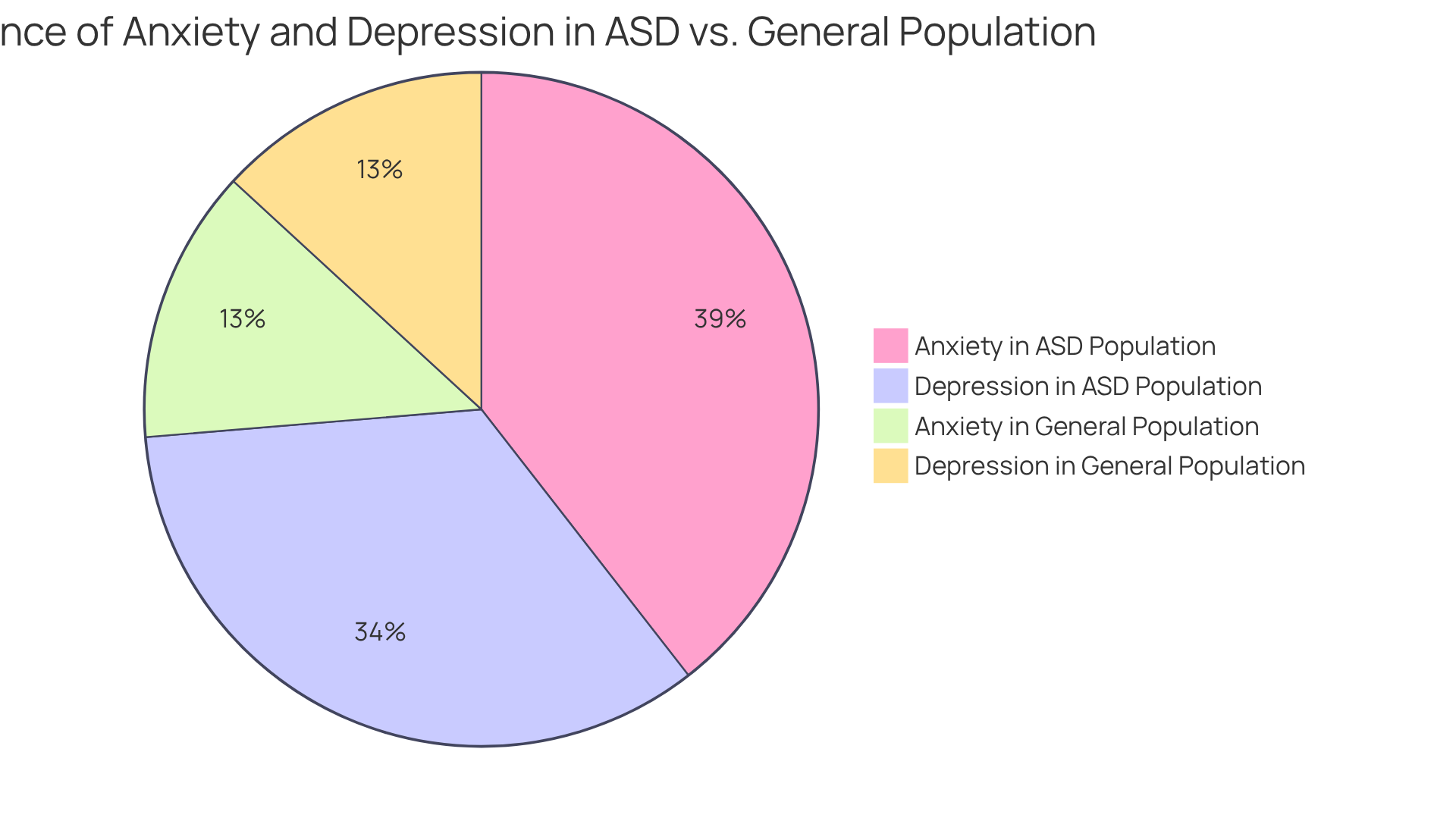
Employment Resources for Autistic Adults: Strategies from Autism Speaks
Autism Speaks provides a range of adult autism resources, including employment tools such as:
- Job training programs
- Resume workshops
- Networking opportunities specifically designed for autistic adults
These initiatives have shown promising success rates. For instance, participants in vocational rehabilitation services have a 12% higher likelihood of securing employment compared to those who do not engage in these programs. Advocates are vital in connecting individuals with these resources, ensuring they have the essential tools needed to thrive in the workforce.
Moreover, fostering workplace inclusion and understanding is crucial for creating supportive environments. Effective job training initiatives reveal that, with appropriate support and adjustments, individuals on the autism spectrum can excel in various roles, positively influencing their workplaces. Experts emphasize the importance of ongoing support and tailored tools as adult autism resources to bridge the employment gap faced by many individuals on the autism spectrum. This highlights the need for collaboration among organizations and communities to enhance job outcomes, ultimately encouraging us all to work together for a more inclusive future.
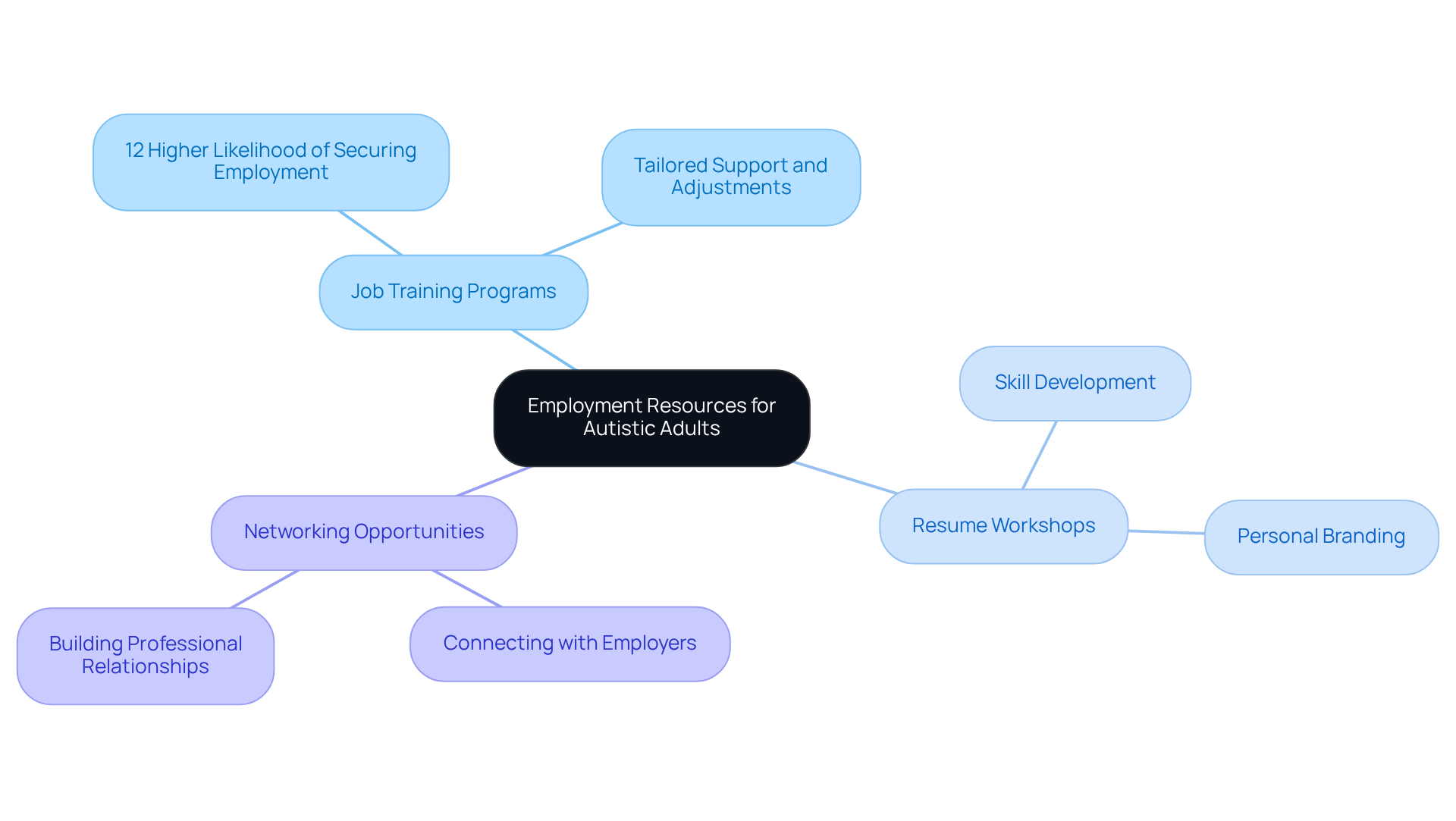
Housing Resources for Autistic Adults: Guidance from Autism Services
Autism Services offers essential guidance on housing choices tailored for individuals with autism, highlighting both supportive living environments and independent housing options. It's important for advocates to familiarize themselves with these choices to effectively assist individuals in finding living situations that promote independence and enhance overall well-being. Did you know that only 5% of autistic adults live independently, while 37% require overnight care? This stark reality underscores the urgent need for supportive living arrangements that can help bridge the gap toward greater autonomy. Understanding available funding opportunities and adult autism resources is vital for effective advocacy, as these elements significantly influence access to suitable housing.
Certain supportive living arrangements, such as supported living and supervised group living, provide occasional assistance with daily activities, allowing individuals to maintain a degree of independence while receiving necessary support. Programs like New Directions for Young Adults exemplify successful supportive living setups that prioritize personal growth and independence. By becoming familiar with adult autism resources and actively pursuing funding opportunities, advocates can empower individuals on the spectrum to explore their housing options and achieve their personal goals. Together, we can create a brighter future for those we support.
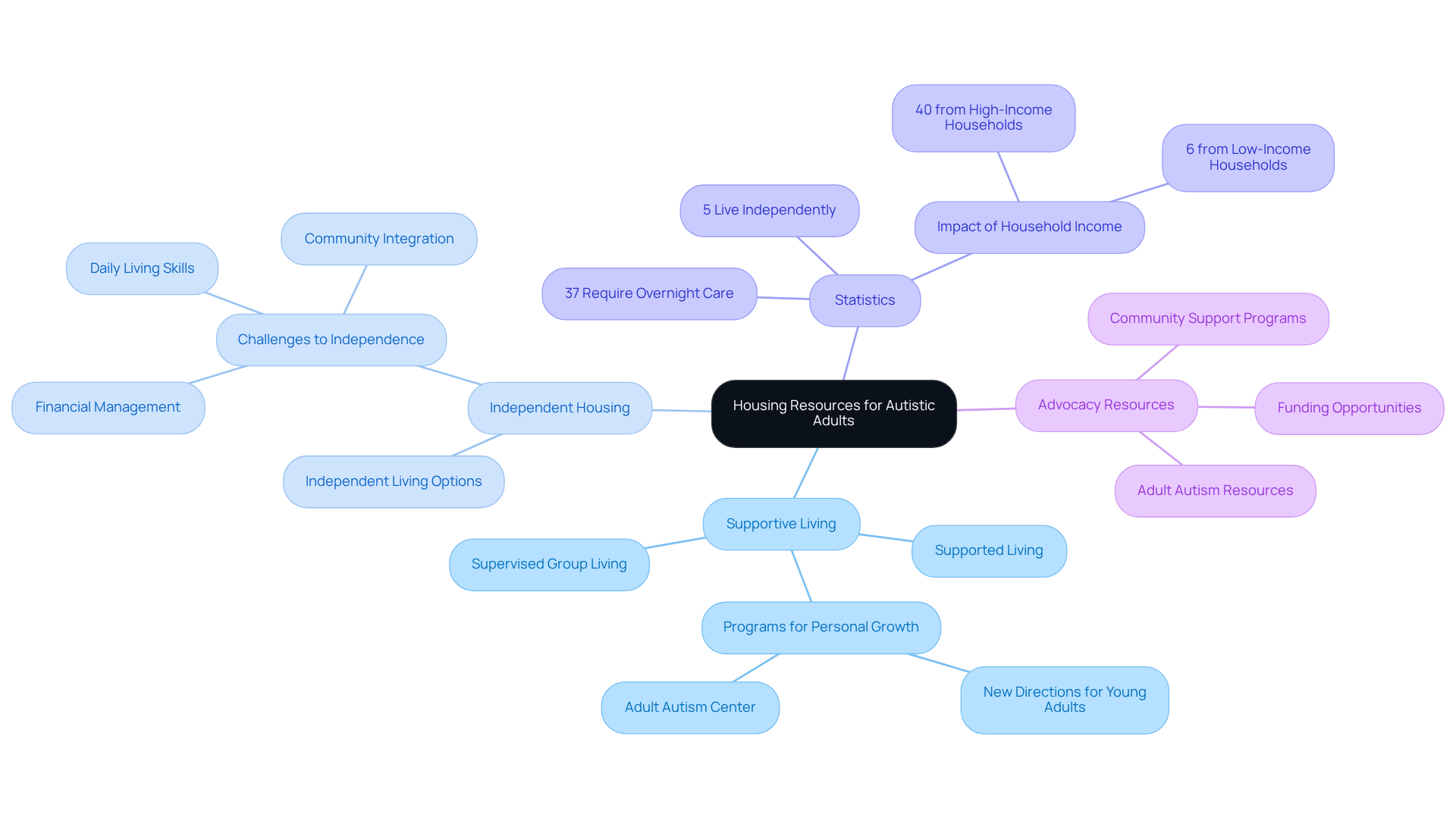
Communication Preferences of Autistic Adults: Insights from Neurodivergent Insights
Neurodivergent Insights shines a light on the diverse communication preferences of individuals on the spectrum, underscoring the importance of adjusting our communication styles to foster better understanding. Effective advocacy begins with recognizing these preferences, leading us to adopt strategies like clear language and visual supports. Did you know that 79% of individuals on the spectrum prefer text-based communication for expressing themselves clearly? This insight can significantly enhance our interactions with them. Furthermore, a striking 91% of people on the spectrum believe that acceptance holds greater significance than mere awareness, emphasizing the broader context of advocacy efforts.
Sensory sensitivities often present challenges in communication, making it essential to develop tailored strategies that respect these differences. By using straightforward language and modeling appropriate social responses, we can further facilitate meaningful exchanges. As we acknowledge and adapt to these unique communication styles, we can create more supportive environments for individuals on the spectrum. Together, we can improve their overall experience and foster a community of understanding and acceptance. Let’s take action to make a difference in their lives.
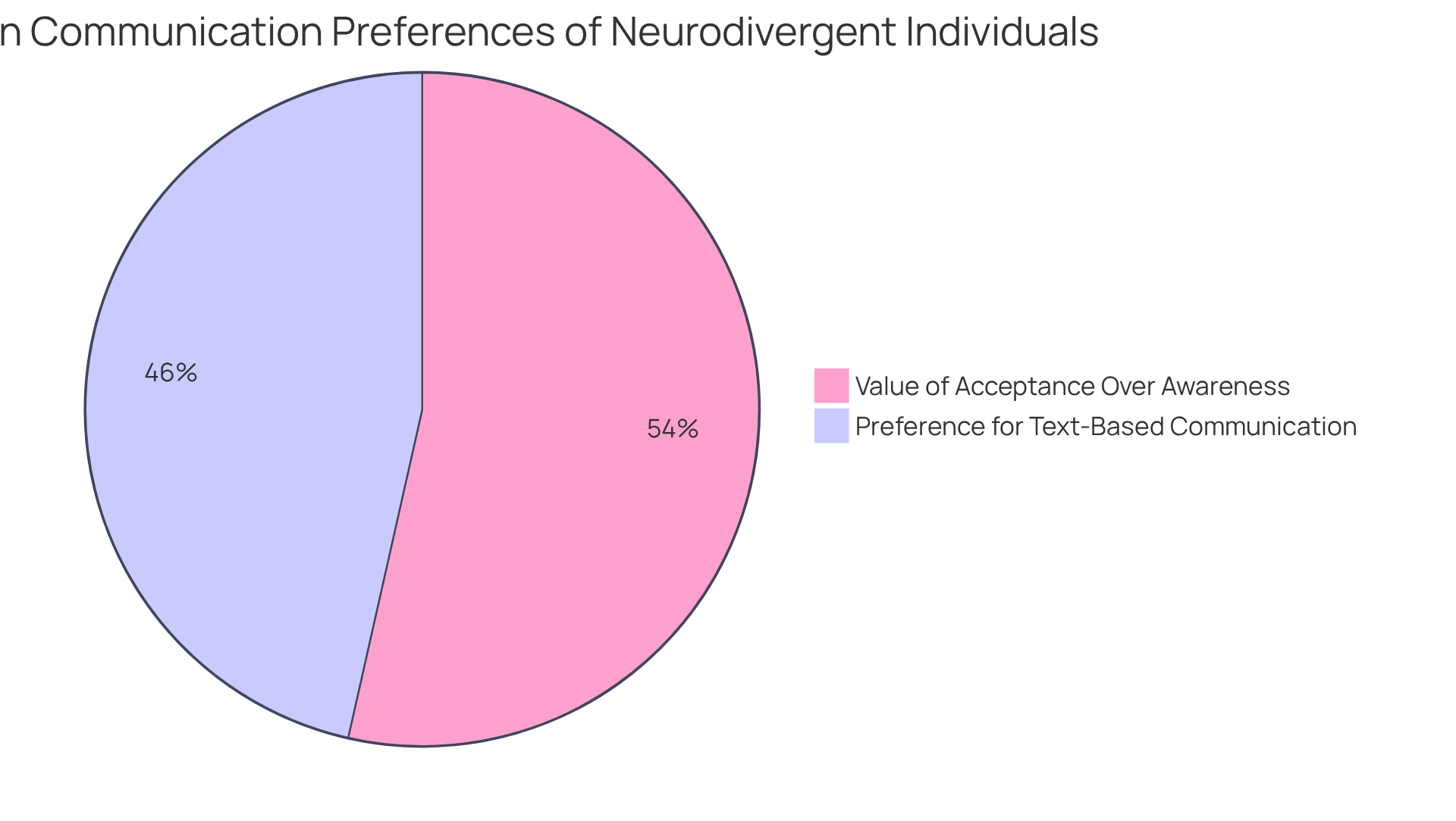
Social Relationships and Emotional Responses: Understanding Autistic Adults
Understanding the social connections and emotional reactions of individuals on the autism spectrum is vital for effective advocacy. Many individuals on the spectrum encounter significant challenges in forming and maintaining relationships, primarily due to differences in social communication. These difficulties can appear as struggles in interpreting social cues, initiating conversations, or responding suitably in social situations. However, effective programs that promote social skills training, such as those utilizing Applied Behavior Analysis (ABA) techniques, have shown promise in helping those on the autism spectrum navigate these interactions. This support can foster meaningful connections and enhance their overall quality of life.
Advocates play an essential role in assisting these individuals by providing resources that encourage social interaction and emotional expression. For instance, structured social skills training programs can empower individuals on the spectrum to cultivate vital communication strategies, boosting their confidence in social contexts. Moreover, quotes from notable figures in the neurodiversity community, like Temple Grandin, who stated, 'I am different, not less,' and Rachel Barcellona, who shared, 'Everyone has a mountain to climb and my condition has not been my mountain, it has been my opportunity for victory,' serve as powerful reminders of the unique strengths and perspectives that individuals on the spectrum bring to social relationships. By embracing these differences and advocating for inclusive practices, we can create environments that nurture emotional well-being and foster authentic connections among autistic adults.
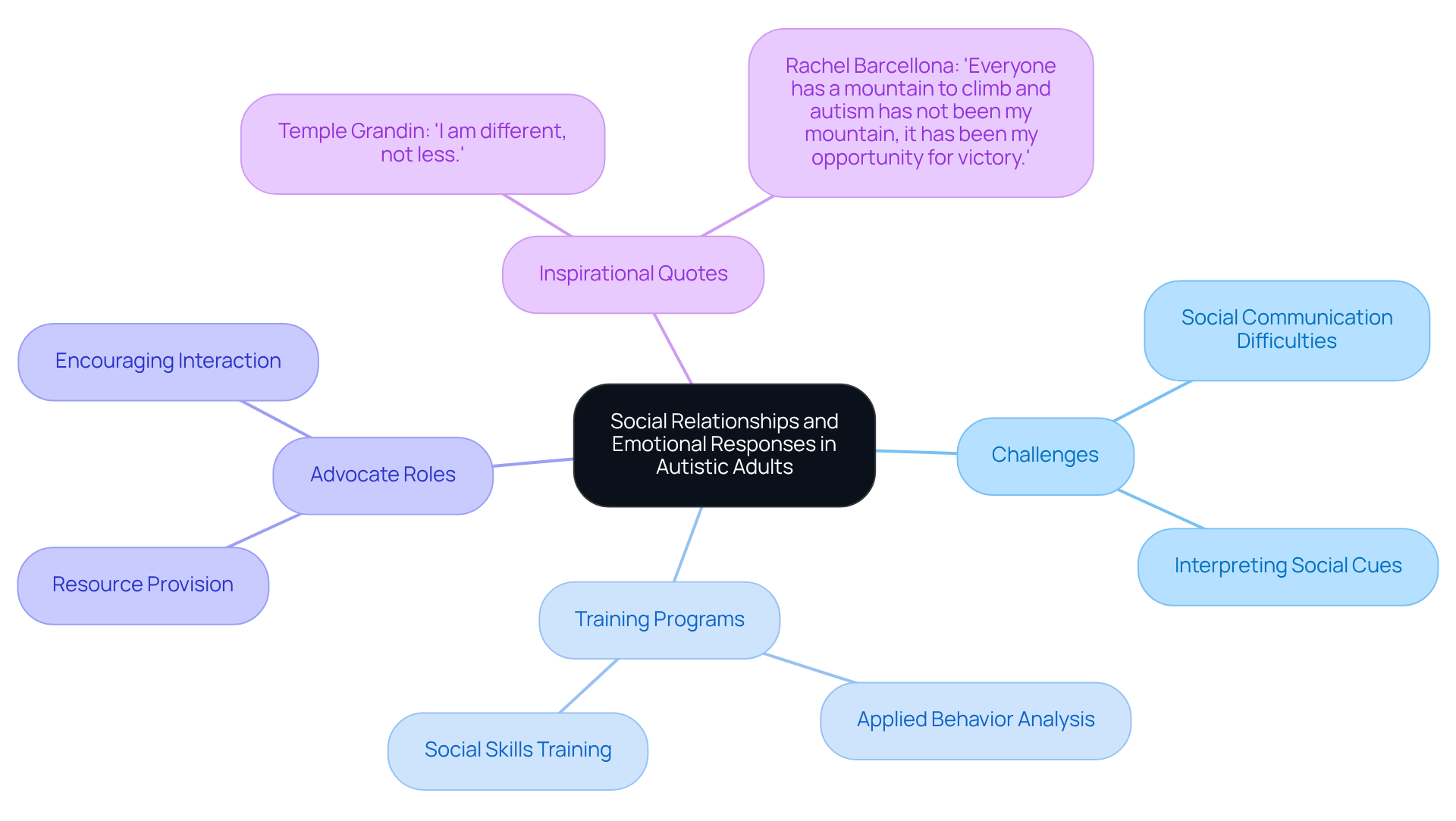
Navigating Autism Diagnosis Challenges: Insights for Advocates
Navigating the complexities of developmental disorder diagnosis can be overwhelming for families. It is essential for advocates to recognize the common barriers that families face, such as limited access to qualified professionals and cultural misunderstandings that can delay timely evaluations. Many families struggle to find experts who truly understand the nuances of the condition, which can lead to postponed diagnoses and interventions. Furthermore, cultural perceptions of autism may create misconceptions that complicate the process even more.
Providing robust support and adult autism resources is vital for families on this journey. Timely and accurate diagnoses are crucial, as they can significantly improve outcomes for autistic individuals. Advocacy efforts should concentrate on raising awareness about these barriers and promoting access to qualified professionals who offer culturally competent care. By fostering a supportive environment and sharing experiences, advocates can empower families to navigate the diagnostic landscape more effectively, ensuring that everyone receives the care and support they deserve.
A practical example of overcoming these barriers can be seen in the case of Stephen, who initially struggled with community engagement due to a lack of confidence. With the encouragement of his team at Croft House, he gradually built his confidence, enabling him to participate in community activities and enhance his social interactions. This illustrates the importance of a nurturing environment in navigating the complexities of autism diagnosis and highlights the role of advocacy in facilitating access to essential adult autism resources.
As advocates, sharing success stories like Stephen's is essential to emphasize the need for culturally competent care. Testimonials from individuals such as Stephen can further underscore the impact of support on confidence and community involvement, reinforcing the notion that timely and accurate diagnoses are vital for improved outcomes.
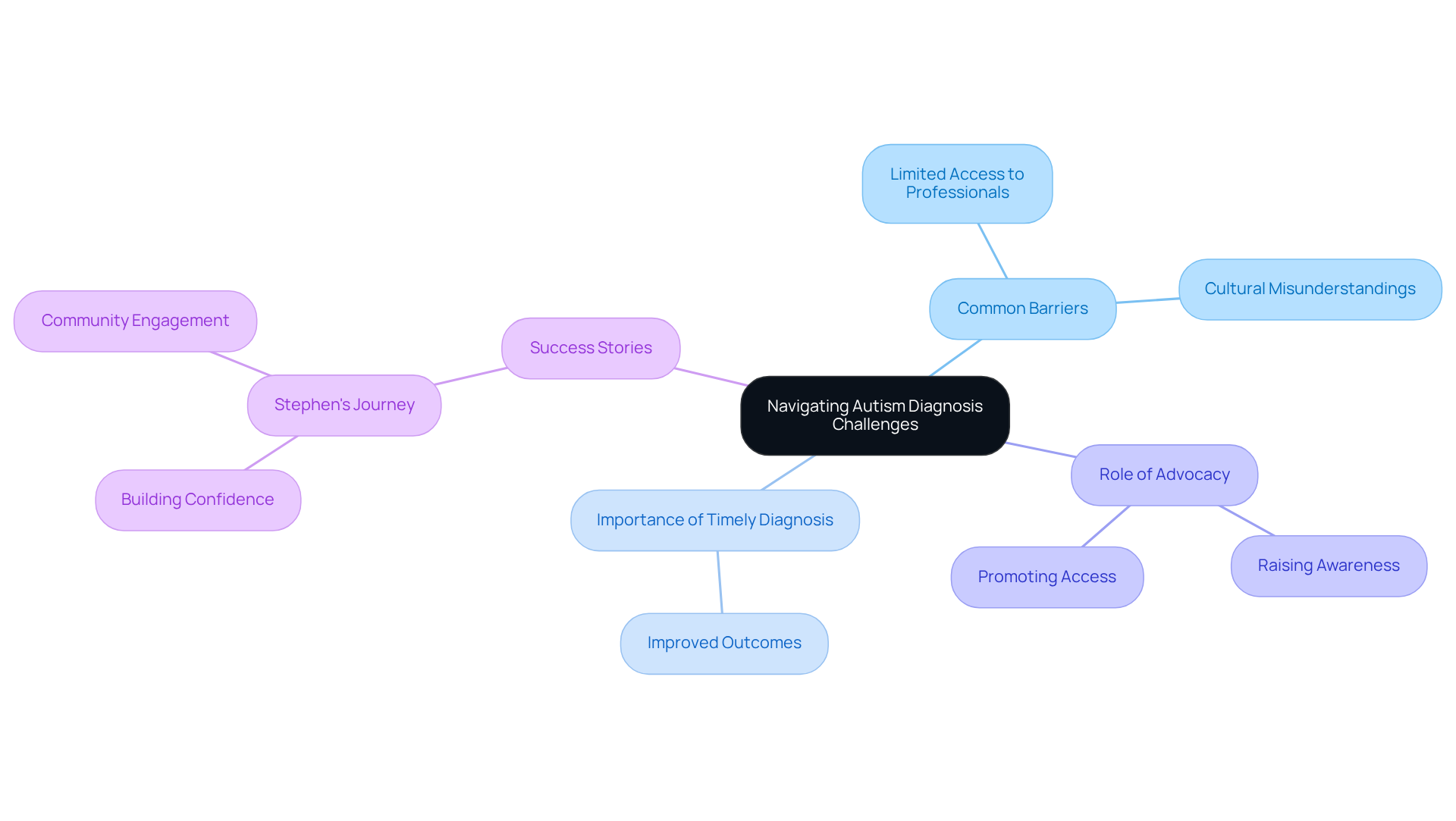
Self-Reflection and Autistic Identity: A Guide for Advocates
Self-reflection is crucial in nurturing a positive identity related to autism. Advocates have a unique opportunity to enhance this journey by encouraging autistic individuals to delve into their distinct traits and experiences. It's essential to provide adult autism resources that promote understanding and acceptance.
Workshops and support groups focused on identity development, such as those that inspire the creation of an 'All about me' book, empower individuals to embrace their autism. These initiatives provide adult autism resources that equip them with the necessary tools to advocate for their needs effectively.
Statistics indicate that self-advocacy among autistic people is vital for personal growth and community involvement, highlighting the importance of these efforts. By facilitating discussions around identity and diversity, advocates can help individuals recognize their inherent value and navigate the complexities of self-perception within a supportive environment.
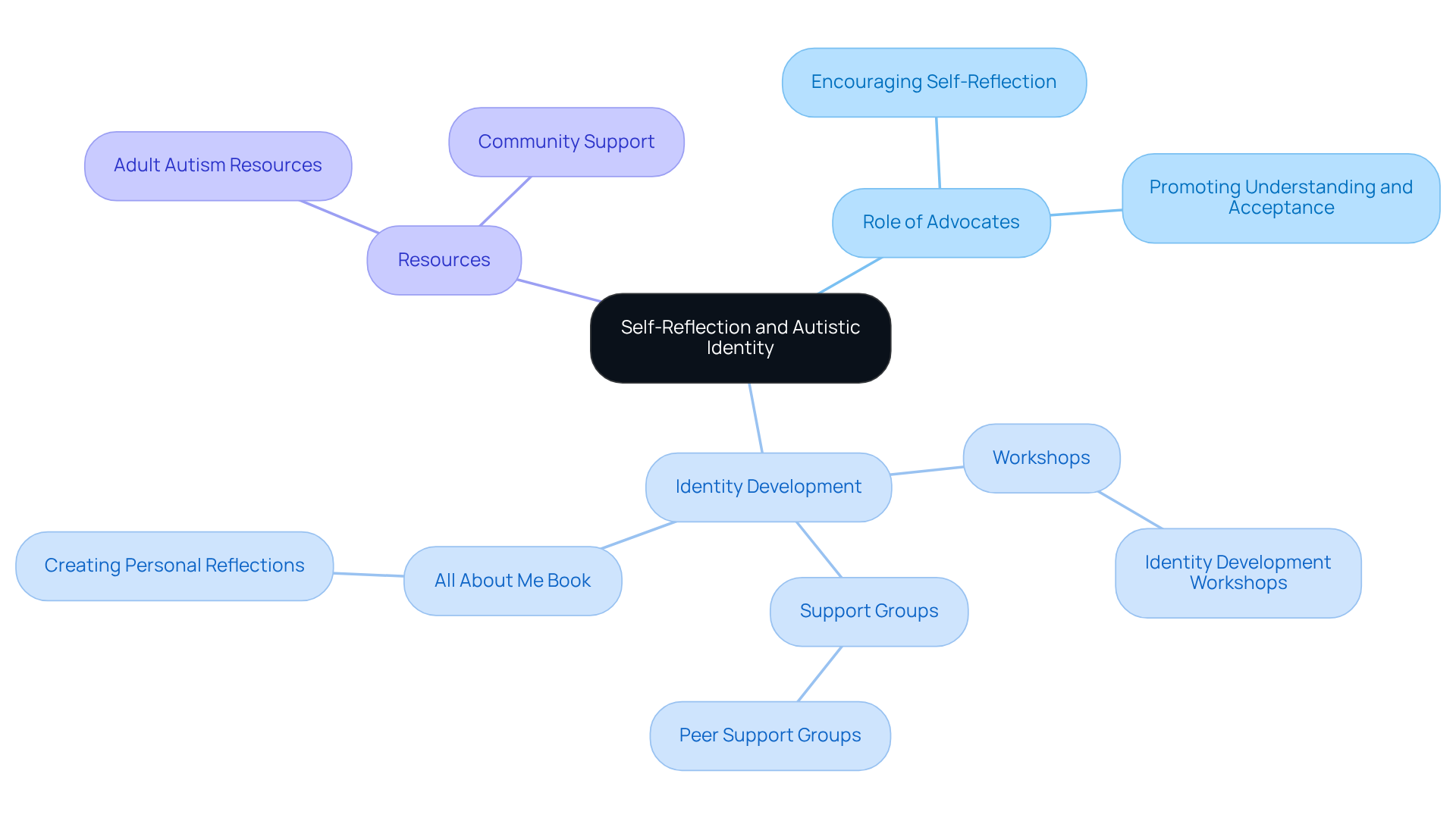
Educate Yourself: Reliable Resources for Autism Advocacy
Understanding this condition and advocating effectively is crucial for providing meaningful support. Organizations like Autism Speaks, the Autism Society, and the Autistic Self Advocacy Network offer invaluable adult autism resources that can deepen our knowledge and skills. As advocates, it's important to seek out training programs, workshops, and literature aimed at enhancing our understanding of autism.
Did you know that the typical age for identification of this condition is around 5 years? Currently, 1 in 36 children in the U.S. is diagnosed with autism, underscoring the urgent need for informed advocacy. By engaging in continuous learning, we can foster a more knowledgeable advocacy approach, ultimately leading to improved outcomes for the autistic community.
As Kyle Coddington, CEO of Prospera Healthcare, beautifully puts it, "Every day, ABA therapists unlock the potential in children with autism, turning small moments into life-changing breakthroughs."
To stay informed about the latest resources and insights, consider subscribing to ASD Media's newsletter. Together, we can make a difference.
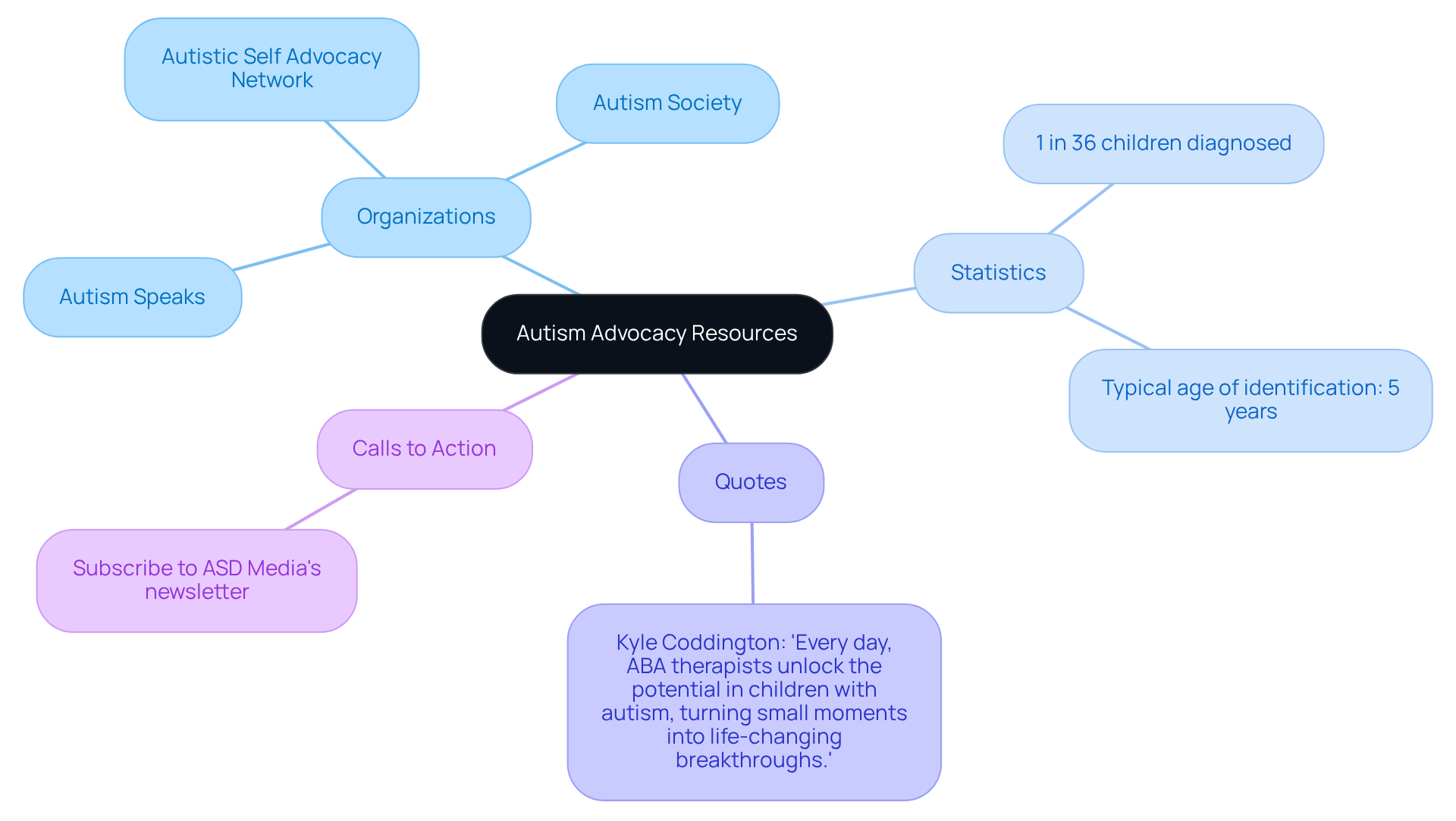
Conclusion
Empowering individuals on the autism spectrum through effective advocacy is vital for nurturing a more inclusive society. This article emphasizes a variety of essential resources and insights that can deepen understanding and support for autistic adults. By confronting healthcare challenges, mental health concerns, employment opportunities, housing options, communication preferences, and the journey of self-reflection, advocates can significantly enhance the quality of life for those on the spectrum.
Key arguments presented highlight the necessity of:
- Respectful healthcare interactions
- The prevalence of co-occurring conditions
- The urgent need for tailored employment and housing resources
Additionally, the insights regarding communication preferences stress the importance of adapting advocacy strategies to meet the unique needs of autistic individuals. By leveraging these resources and insights, advocates can effectively navigate the complexities of autism and empower individuals to flourish in their communities.
The call to action is unmistakable: continuous education and awareness are crucial for effective advocacy. Engaging with trustworthy organizations, participating in training programs, and fostering supportive environments can catalyze lasting change. By dedicating themselves to these efforts, advocates can not only improve the lives of autistic individuals but also contribute to a broader movement toward understanding and acceptance in society. Together, the pursuit of informed advocacy can lead to enriched outcomes and a more inclusive future for all.
Frequently Asked Questions
What is the mission of ASD Media?
The mission of ASD Media is to enhance the application of ABA therapy by providing resources and insights for parents and professionals, fostering a nurturing community for sharing experiences and learning.
How can I stay updated with ASD Media's resources?
By subscribing to the ASD Media newsletter, you will gain access to the latest news and valuable adult autism resources designed to empower you in autism advocacy.
What challenges do autistic adults face in healthcare settings?
Autistic adults often encounter difficulties in accessing quality healthcare due to a lack of understanding from healthcare providers about their specific needs, which can lead to communication struggles and anxiety during medical appointments.
What statistics highlight the healthcare challenges faced by individuals with autism?
Individuals with autism are 2.6 times more likely to experience physical health issues compared to non-autistic peers, indicating a pressing need to address barriers to healthcare access.
What initiatives can help improve healthcare access for individuals with ASD?
Advocacy efforts, including six recommendations aimed at improving healthcare access, can empower advocates to raise awareness and promote tailored strategies within healthcare settings.
What co-occurring conditions are commonly found in individuals with autism?
Many individuals on the autism spectrum face co-occurring conditions such as anxiety, ADHD, and depression. For instance, 30% of the ASD population suffers from anxiety, and 26% experience depression.
Why is it important to acknowledge mental health challenges in autism advocacy?
Acknowledging mental health challenges allows advocates to adopt a holistic approach to support, helping autistic individuals and their families navigate mental health care and access resources effectively.
What percentage of children with developmental disorders experience anxiety or depression?
Nearly 39.5% of children with developmental disorders experience anxiety, while 15.7% struggle with depression.
How prevalent are co-occurring diagnoses among children and adolescents with ASD?
A staggering 91% of children and adolescents with ASD were diagnosed with one or more co-occurring diagnoses, highlighting the high prevalence of these conditions.
What is the significance of early intervention for preschool children with autism?
Nearly 45% of preschool children with autism already have mental health conditions, underscoring the critical importance of early intervention to address these challenges effectively.




